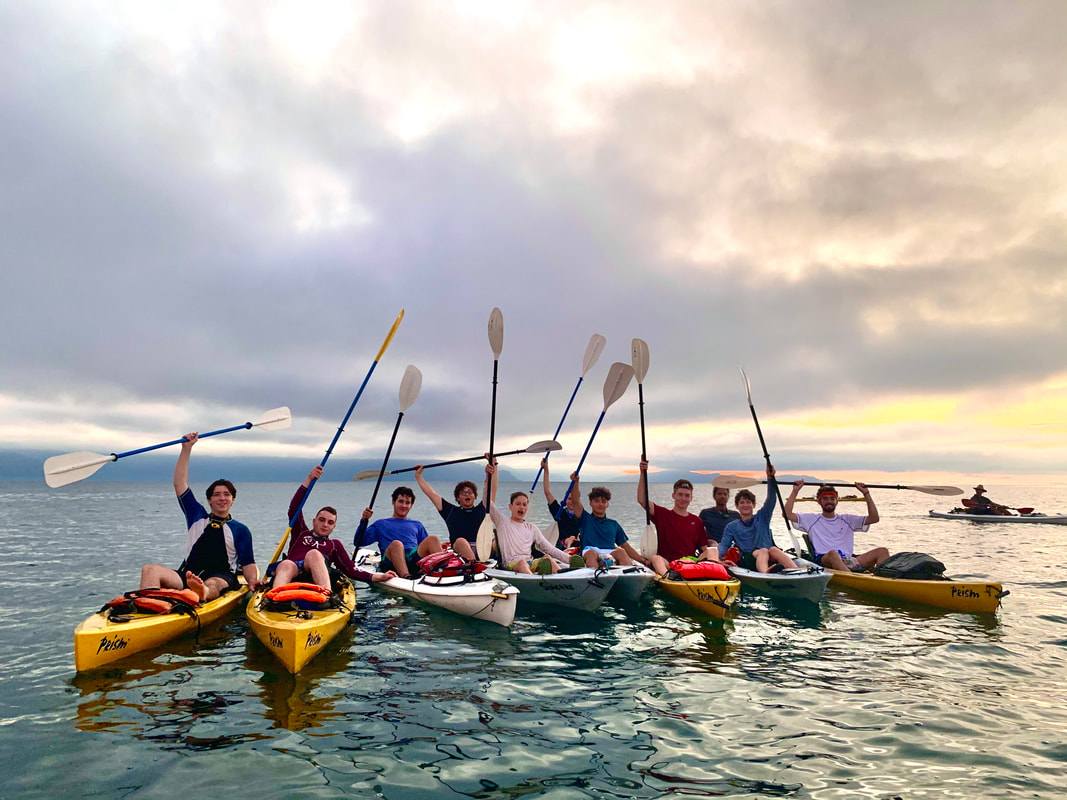After calls with all programs, we chose to divide and conquer visiting two schools. I toured the school in the mid-west. The program seemed solid and the staff engaging. The location was remote, mountainous, and beautiful, but cold. I could see him here, I thought. This could work. When I compared notes with my son’s dad, however, the differences in our impressions were striking.
He talked about being greeted by staff with hugs, how a white board marked out all activities for the week, from therapeutic groups and excursions for surfing, down to who had a dentist appointment on Wednesday. He talked about close, individual engagement, comprehensive personal growth plans, and tailored learning programs. And he talked about the beautiful outdoor setting, with an open air gym and dining hall, not to mention delicious food. The comparison between the two schools was hardly fair. But could we send our son off to another country during this difficult period in his development? Ultimately, we decided yes. And we are forever grateful that we made this choice.
These are some of the factors that got us “over the hump” about sending our son to a school in a foreign country:
- Costa Rica is a safe country (they haven’t had a military since 1948) and NSA provides a safe, fenced in campus with 24/7 security guards
- Studying in a foreign country might give our son a sense of personal achievement distinct from his peers back in the States
- Living in another culture might widen his world and personal vision beyond the generally homogenous culture to be found in our upper middle class major metropolitan environs
- The temperate weather and activity options were better suited to our son who did not participate in snow sports and we knew physical activity would be a big factor in his progress and process (more on this later)
- NSA only admits students who want to be there. They will not take your son "kicking and screaming,” so if he attended NSA, he would have to invest in the program
- NSA does not follow a rigid set of levels in its program; there is room for adaption, modification and self-advocacy, but there are also rules and community norms that must be followed
- An all-boys school would eliminate distractions
- NSA was willing to allow visits on an ad hoc basis and did not adhere to a strict visitation schedule
- Travel time from the east coast to Costa Rica was no different or even faster than flights to the midwest which are plagued by delays in the winter
- And I can’t emphasize enough how warm and caring the staff at NSA are. This is a place where EVERY staff member is invested in the care of your son.
I cannot describe our entire experience at NSA but I offer a few highlights:
- NSA paired our son with two therapists who were SPOT ON for him. They related to him immediately and he to them. They were young and cool - one with more experience, one newer in his role. Both “got” our son. They called him on his BS. They established trust with him and eventually he began to reach out for their advice and counsel independently. They pushed him to open up despite his resistance to show emotion. They were straight shooters and consistently worked with our son on the challenges that would face him when he left the safe bubble of NSA. Under their guidance, he leaves NSA with remarkable personal insights into his own areas for growth and has made substantial progress in addressing each area. His “toolbox” for navigating the “real world” is so much better equipped as a result of his work with the entire team at NSA. As parents, they pushed us to be better communicators, listeners, and collaborators with our son. Ultimately, they helped us become better parents.
- NSA gave our son the space, motivation and encouragement to stick with a goal - to improve his physical fitness. Although he had always been athletic, during his year at NSA, our son put on 30 lbs of muscle working out almost every day. But this was about so much more than just a physical transformation. He learned to work hard and not to give up (as he had with so many of his other good intentions). He learned to be a leader by encouraging others to join him in his physical pursuits. He learned that exercise is a healthy coping mechanism for stress and anxiety. And he developed a self-confidence which had been sorely lacking at home.
- NSA gave our son the support and tools to excel academically. The English teacher became a close confidant. The science teacher met students before class to workout in the gym. The culinary arts teacher introduced our son to a newfound joy of cooking. The academic team built the scaffolding for success. All of these folks are exceptional. In addition to academic achievement, however, our son developed a number of key skills that will help him moving forward in his educational journey, including self-advocacy skills (seeking out support when needed - a 180 degree turnaround from his tendencies before NSA); resiliency (getting back on track after academic lapses instead of giving up); and academic risk-taking (trying more difficult courses, even if it ultimately didn't work out).
- NSA adapted on the fly. When a family emergency arose, they quickly pivoted to allow our son to come home for an early unscheduled visit, which caused a bump in the road but also provide the opportunity for all of us to learn how to handle the unexpected stresses that happen in life.
- NSA created a safe bubble for its students during the COVIC19 pandemic. While other families in the US were scrambling to adapt programs for remote learning, NSA’s foresight to create an early self-quarantine allowed the boys to continue their education, activities, therapeutic work, and socialization without social distancing.


 RSS Feed
RSS Feed
